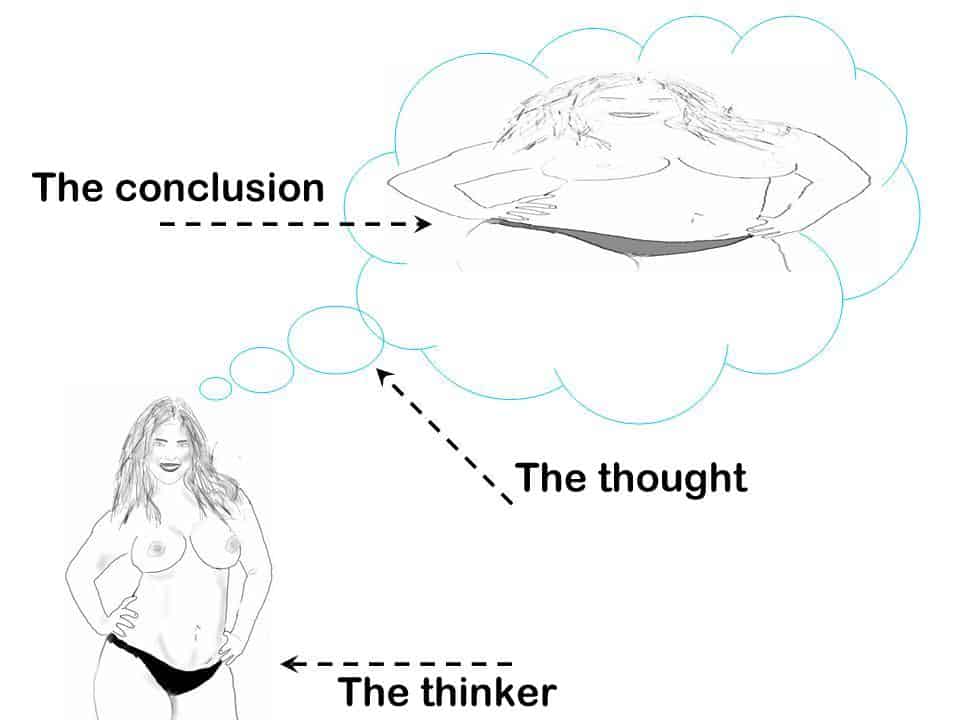 I want to talk about identity as perhaps the most important and often overlooked part of going beyond jealousy. Let us ask “who” gets jealous. If we will look at our own self-concept, the questions around this destructive emotion change. Unfortunately, the inquiry may not come spontaneously, as jealousy arises, intense feeling and finding some relief from the anguish may seem the only problem. Most of us see many faults in self-centered possessiveness but that does not necessarily stop the distress. While seeking security by changing people or circumstances including imposing rules and making agreements, we overlook many habitual ideas about ourselves that are a large part of the difficulty.
I want to talk about identity as perhaps the most important and often overlooked part of going beyond jealousy. Let us ask “who” gets jealous. If we will look at our own self-concept, the questions around this destructive emotion change. Unfortunately, the inquiry may not come spontaneously, as jealousy arises, intense feeling and finding some relief from the anguish may seem the only problem. Most of us see many faults in self-centered possessiveness but that does not necessarily stop the distress. While seeking security by changing people or circumstances including imposing rules and making agreements, we overlook many habitual ideas about ourselves that are a large part of the difficulty.
Please read the first three of this series on Jealousy offered freely.
Discovering You Are Not Monogamous – Meeting Jealousy
How To Deal With Jealousy
Different Faces of Jealousy
This subject is not simply an intellectual exercise and deserves more than musing. Sometimes people die because of possessive reactions. I am going to try to say something that maybe you have not heard before. Please suspend judgment for the time being and reflect how awful and dangerous the different faces of jealousy can be.
Possessiveness is a habit of thinking about our-selves in relation to others. I do not believe we break any habit unconsciously because autopilot is itself the realm where habit dominates. We need a conscious willingness to look at self-centeredness and fear particularly when these tendencies have been redundant for years. Consider, we can smoke cigarettes unconsciously or we can do it with awareness. We can also stop smoking, though many know how difficult this vice is to break. The habits around identity are perhaps even stronger and have been around since we began to conceive of our selves.
I write for people who wish to discover a way beyond jealousy other
than deceit, which seems the preferred method often hidden in the
word “discreet.”
If one partner does not know then rivalry cannot arise. Now turn the inquiry to the implication hidden in possessive beliefs. The one called “me or “I”, what we conceive of as “self” is strongly tied to feeling jealous. Possessiveness has less to do with others and more to do with the feelings we create through thinking about our world and ourselves. Others do not exist to reflect or prove our ideas about ourselves.
People Are Not Possessions
Let us begin with some distinctions in our mind and then try with a thought experiment. To tell apart the thinker from the thinking itself and what the thought is about consider this image.
 Thinking about ourselves is useful. Buying plane tickets for a vacation requires conceiving where you need to be and when. When we are making a plan, we imagine a future and ourselves in it and both aspects are mental. If we forget or do not notice when we are conceiving ourselves and mistake that complex of thought for who we really are it is like mistaking the banana we can eat with the idea of the fruit that has no calories whatever. This understanding is important because mistaking our mental representations for fact is easy to do.
Thinking about ourselves is useful. Buying plane tickets for a vacation requires conceiving where you need to be and when. When we are making a plan, we imagine a future and ourselves in it and both aspects are mental. If we forget or do not notice when we are conceiving ourselves and mistake that complex of thought for who we really are it is like mistaking the banana we can eat with the idea of the fruit that has no calories whatever. This understanding is important because mistaking our mental representations for fact is easy to do.
 Let the woman on the right represent any of us male or female. Anything we can imagine about the self we are free to impose on the concept i.e. good, bad, pretty, ugly, smart, unlovable etc.
Let the woman on the right represent any of us male or female. Anything we can imagine about the self we are free to impose on the concept i.e. good, bad, pretty, ugly, smart, unlovable etc.
There is an inherent circularity in thinking about the thinker and we cannot imagine what it would be like not to imagine ourselves. And, still we continue to exist in a moment without thinking.
The Thought Experiment
- Imagine yourself sitting about ten feet away from where you are now and visualize what the scene would look like if you were looking through the eyes of the fantasy self.
- Now move that conceived self about the room and change the perspective accordingly, then nearer to where your actual body is located.
- From each new perspective, you visualize the changes you would see, but in each case you would obviously grant that ALL that you envision from the abstracted self could only be conceptual.
- Now impose that thought of self on the your body like clothes. You will see that anyone could forget that exactly the same thought process can continue. Everything seen though the eyes of the imagined self would still be conceptual but now the idea of self is “glued” onto the body.
For the same reason we cannot eat the thought of a banana we cannot be what we think of ourselves. We are more than any thought about ourselves. We find many mistakes believing what we conjure in the mind as a public fact outside ourselves. Please do not underestimate the implication of this point. We are not obligated to believe or obey anything we think including what we think about ourselves. In the same way we can think of shoving a pineapple up our ass and not enact the deed, we can disobey any thought including thoughts about the subject we call “I.”
A strong habit may have more influence on our emotion than the realization that the concept may be false or wildly distorted. The emotional influence of any tendency will not transform anything that is false into something true. We cannot be the mental identity we create no matter how much it appears to be “who we really are.” In a moment without thought, the sense of self we create in mind disappears and we are still here. Our schematic of self has been changing from the first time we conjured it. The thought we call “I” causes misery when we mistake this mental reflection for the being it represents. No such identity can ever be stable because it is as unreliable as the thought that constructs it. In jealousy, this constructed identity is under a threat. Let us take an example.
A romance-motivated stalker obsessed with another relates to the mind. After all, the desire to be with another when that someone does not reciprocate the feeling is not just a recipe for misery, it is not fact based. Why does the misguided paramour misunderstand this point? The would-be lover is constructing an idea of the relationship in a future and is identifying the present body-mind with that spell cast in the mind. Stalkers experience many feelings based on things that never happened. No matter how beautiful the imagined events appear, they change no fact. The wannabe lover loses this self-manufactured joy when the reality becomes clear. It seems as if the person rejecting their advances has destroyed their happiness. We cannot really lose something we never possessed. This also happens when someone remembers a real experience of joy in relation with another.  The idea that it could be that way again incorporates past experiences in the fictional narrative about the future. The observation, intuition and reason of the obsessive person is misguided by mental images. Our instincts can be fooled by something false like a chicken will brood on a wooden egg.
The idea that it could be that way again incorporates past experiences in the fictional narrative about the future. The observation, intuition and reason of the obsessive person is misguided by mental images. Our instincts can be fooled by something false like a chicken will brood on a wooden egg.
The most striking example of jealousy as a mental event is when the experience happens and no rival actually exists. In other words, the possessive jealousy is a purely mental event. We can also insert real facts into the mental narrative such as our partner’s behavior up to and including sex with others.
When we are inventing agony by jealously focusing on a mental self, e.g., “what’s wrong with me,” we are probably imagining loneliness, fear, and worry about our reputation. Reiterating the wrongness of a lover fucking another we obviously have an idea of the way the circumstances should be instead. In the ideal world, there is a satisfied imagined self and we judge our real circumstances referring to that blatant fiction. If the way it “should be” is clearly not happening, then our judgments based on that concept have the terrible weakness of not being fact based.
Some might be tempted to explain away such possessiveness as “natural” in evolutionary terms such as alpha dogs fighting for females who are not instinctively known for their fidelity. I am suggesting here that the triggers for our instincts are often imaginary, the way we feel fear of falling a dream. However, even if we assume it true that jealousy is product of evolution that does not thereby make it an advantage. Most of evolution’s attempts at life are now extinct. Our ability to disobey instinctual impulses also falls within the scope of evolution. Moreover, people who do not suffer jealousy also emerge from evolution so this explanation is neither conclusive nor justifies possessiveness.
Take the statement, “If you want to fuck anyone else, then you don’t love me.” We enthusiasts of open relationships may remark how narrow is such a definition of love. Still, when another is screaming and throwing things, redefining terms probably goes nowhere. The important question is – does the jealous person want to explore anything outside of their current ideas. If the answer is “no”, then we must either acquiesce to their idea of fidelity or separate because the discussion is at an end. Sometimes we can keep emotion at bay but it can reassert itself at anytime.
It is not enough to find fault with the logic of someone jealous. People love to use logical statements in relationship while refusing reasonable scrutiny claiming the matter is subjective and “beyond reason.” This is a naked double standard. When people make or imply statements such as – “if you loved me, then… replace italics with something desired” – these are logically formed statements. We cannot prove the belief is true but we can show a belief is unreasonable or inconsistent with facts or things previously stated. Such effort will likely be useless without an understanding of the mechanism of identification illustrated above. I do not want to belabor this point but I do not want to minimize it either. When something happens in relationship that is beyond our expectations, it is not necessarily a confirmation of our worst fears. Without such recognition it feels as if a threat actually exists.
When our identity experiences a peril, it is similar to the emotion we feel running from a monster in a nightmare. It seems real until we understand it is only a dream. In the passionate heat of such pathos to suggest that the problem does not really exist appears absurd to the one having the experience. Their response to such a suggestion will probably be something akin to “fuck you, you fucking selfish asshole! Etc.” Still the threat may in fact be only to an idea about who we are. Many of us have seen sweet encounters destroyed by unfounded suspicion turning into self-fulfilling prophesy.
If we wish to invite experiments in sexual kindness, receptivity and generosity, we need to understand our thinking, as well as that of others and forgiveness of mistakes is important. Anyone can confuse an idea for a fact. I am not saying we should endure dangerous circumstances but that we need not run from an imaginary lion. The ability to distinguish between public facts and our thoughts about them is as important as the ability to disobey a passion induced by thinking. We need not smoke cigarettes just because we have a strong desire to do so, take it from a fellow who started smoking as a zygote in the uterus who ended a daily three-pack habit twenty-eight years ago. I loved tobacco but it is destructive and unnecessary. Similarly, our habits of mind can trigger at any time but we have no obligation to obey.
Neither people nor the world exists to coincide with our identity or desires. To think otherwise is to live in self-centered fear, which leads to attempts at manipulating people and events to support an idea of self we will not find when we look. We let this idea of self go whenever we drop into deep sleep, quiet mind, or death. Do not insist that death be the only event that can free us from the idea of self when we are not obligated to believe or obey any habit of thought. Remember the pineapple suppository and our capacity to disobey thought. We are creatures capable of powerful abstraction and this is wonderful if the power to conceive serves our life rather than the other way around.
Content Copyright 2014 © Vickers Publications. All Rights Reserved

Pingback: Women’s Self Concept Body Image
Pingback: Stop excusing jealousy as natural | No Shame in Sex
Can jealousy be helpful?
I doubt that jealousy, at least as I define it, can be helpful. I have never seen where I thought jealousy helped anything. Have you Melissa?
It may be argued that the anguish of jealousy prompted someone to become aware of their selfishness.
Possessiveness does not value the other as an end unto themselves but only as a means. Some folks view jealousy as ‘proof’ of love. In the extreme such jealousy has killed, should we call this murder a supreme demonstration of love? I don’t think so.
When someone would be willing to sacrifice the joy of another to avoid jealousy, I have a hard time imagining a circumstance where that could be helpful. Maybe such a circumstance exists, but I would have to see very strong facts and reason in favor of possessiveness, and also against all the other alternatives in the circumstance. Until I see such proof if favor of jealousy, my stand is no, jealousy is not helpful.
Yes, I also do not support jealousy as “proof” of love, denying another’s full self-expression, or justification for a violent act.
In my life and in my coaching practice, I invite a reimagining of “negative” emotions as not being a problem, but the solution. So I approach jealousy as an opportunity to engage in self-awareness. When my clients speak about the role jealousy plays in their relationships, I present them with several questions that allow them, if they’re willing, to go deeper and get to the root cause of what’s happening for them.
From there, we can take actionable steps towards compassion, forgiveness, and healing.
Pingback: How to Defend Our Sensuality, The Hippie in Us All | No Shame in Sex
Pingback: Different Faces of Jealousy | No Shame in Sex